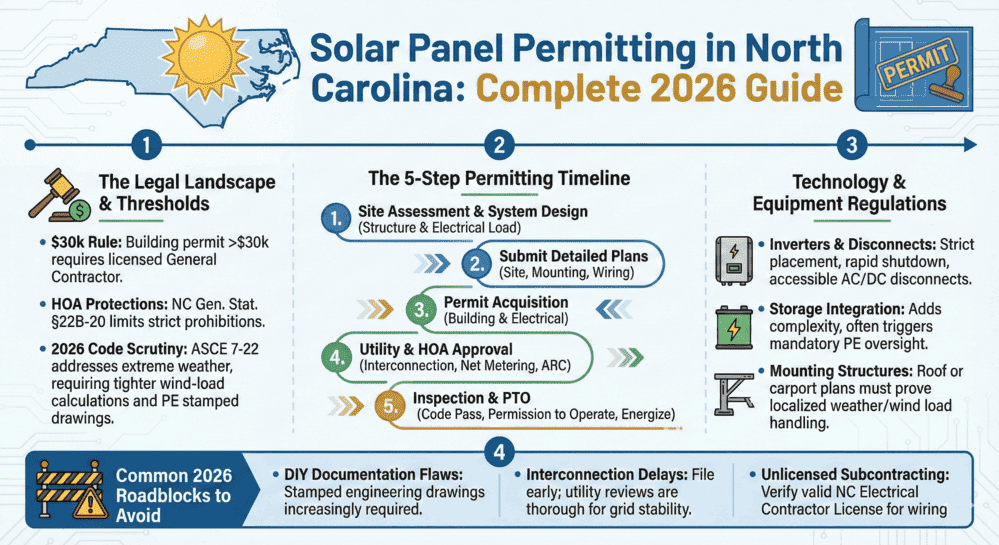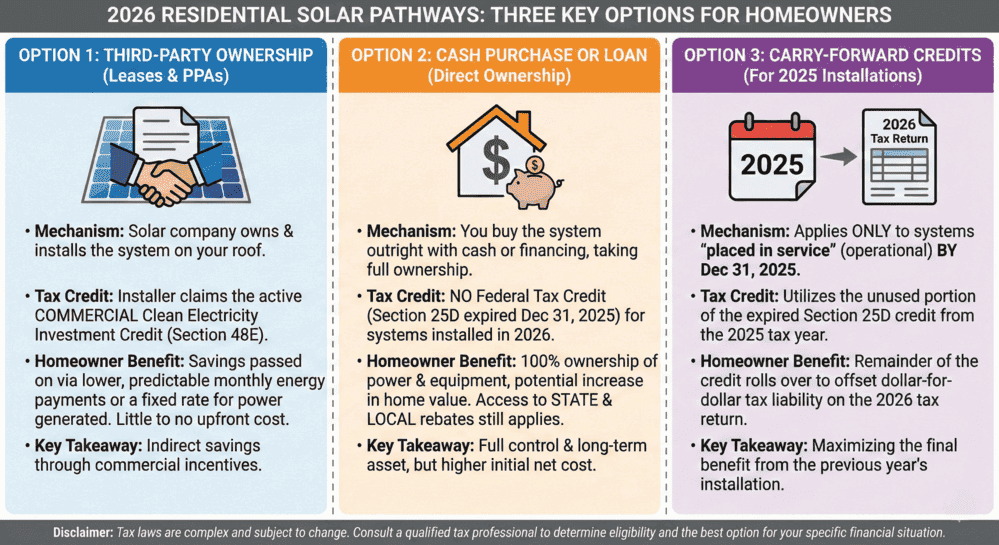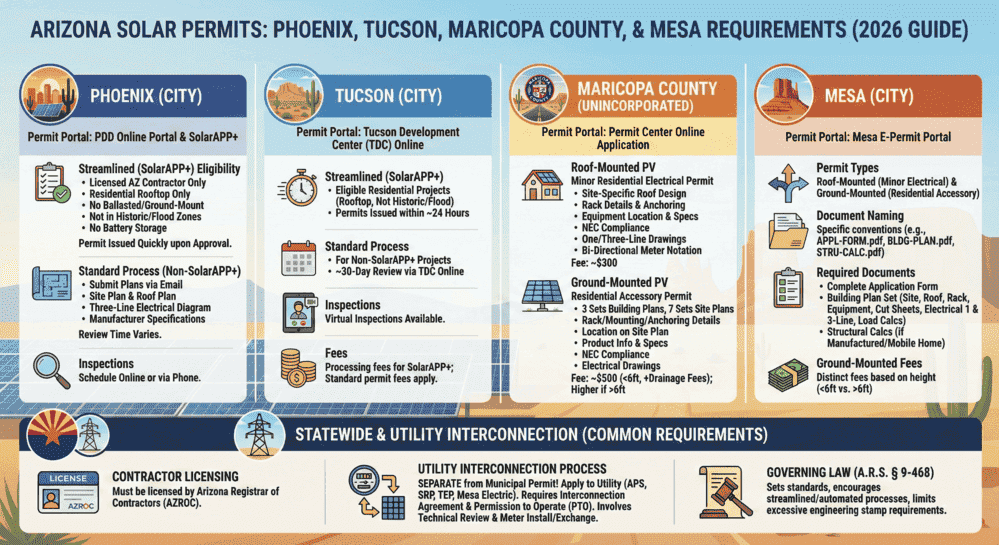Do you need a permit for solar panels in Arkansas? Yes, all solar panel installations in Arkansas require permits from local building departments. Residential systems under 10 kilowatts cost $25 to $350 in permit fees, and the complete approval process takes 6 to 16 weeks from start to activation.
What permits are required? Arkansas homeowners must obtain both building and electrical permits before installation. Building permits verify roof structural integrity, while electrical permits ensure wiring meets National Electrical Code standards. Most jurisdictions follow International Residential Code (IRC) requirements with local amendments.
The six-step permitting process includes: system design development, application submission with fees, jurisdiction review and approval, licensed contractor installation, local authority inspections, and obtaining Permission to Operate (PTO) from utility companies. Systems qualifying for simplified review receive approval within days, while complex installations take several weeks.
Critical licensing and policy updates: Arkansas law requires licensed contractors holding both Residential Building Contractor and Electrical licenses. The state’s net metering policy changed in 2024. Systems installed after September 30, 2024, receive approximately 4 cents per kilowatt-hour for excess electricity, while grandfathered systems maintain the previous 10 cents per kilowatt-hour rate through 2040. Solar owners receive a 30% federal tax credit on total installation costs, but this credit expires December 31, 2025.
How Solar Permitting Works In Arkansas
Permitting refers to the official approval required by local government authorities to install a solar energy system. The process ensures installations comply with safety regulations, building codes, and electrical standards while confirming the system can integrate seamlessly with the local electrical grid.
In Arkansas, the permitting process varies by city and county, with each jurisdiction maintaining its own specific requirements. Most municipalities follow the International Residential Code (IRC) and National Electrical Code (NEC) standards, though local amendments may apply. The state permitting portal provides access to various environmental and construction permit applications.
Why Solar Permits Matter For Your Installation
Permitting serves as a critical step in ensuring solar installations remain safe, legal, and compliant with local and state building codes. This protection extends to property owners, the surrounding community, and the environment. Obtaining proper permits ensures solar systems qualify for utility grid connection and any available incentives or rebates.
Without proper permits, installations risk fines, project delays, and potential system removal. Securing appropriate permits represents more than a formality; it stands as an essential component for successful solar projects.

The Complete Arkansas Solar Permitting Journey
The solar permitting process in Arkansas follows several key stages.
First Stage: Create Your Solar System Blueprint
The permitting process begins with preparing a design for the solar panel system. This involves working with a licensed solar contractor who assesses the property and develops an installation plan. Designs must adhere to local building codes, the International Residential Code, and electrical requirements under the Arkansas State Electrical Code.
Key Considerations:
Roof strength: The roof structure must support the weight of solar panels and mounting equipment, meeting Arkansas State Building Code load requirements.
Energy requirements: System size should align with energy consumption patterns.
Safety codes: Arkansas enforces specific safety rules regarding solar installations, particularly concerning equipment placement, setbacks, and fire access pathways.
Second Stage: File Your Application With Required Fees
Once the design is finalized, contractors submit necessary documents to the local building department for review. Applications typically include:
Structural plans: Verifying the roof can safely support the panels.
Electrical plans: Detailing wiring, inverters, and other electrical components.
Fees: Permitting fees vary by jurisdiction, typically ranging from $25 to $350 for residential systems under 10 kilowatts.
Initial responses from local authorities generally arrive within a few days to several weeks. Factors such as application completeness, system complexity, and seasonal workload can influence processing times. Cities like Fayetteville provide guidelines for solar installations.
Third Stage: Undergo Review Process And Receive Approval
Local jurisdictions review permit applications to ensure compliance with all local, state, and national standards. Processing times range from a few days for simplified reviews to several weeks for more complex installations.
During review, authorities may request additional documentation or plan modifications to meet specific code requirements. Addressing these requests promptly helps avoid unnecessary delays.
Fourth Stage: Complete Professional Installation
Installation begins once permits receive approval. Licensed contractors install solar panels, inverters, and other necessary components. Installation typically takes one to three days, depending on system size and complexity.
Throughout this stage, contractors ensure everything is installed according to approved plans while maintaining strict adherence to safety protocols.
Fifth Stage: Pass Required Inspections
Following installation, solar systems undergo one or more inspections by local building authorities. These inspections verify installations meet all safety and building code requirements.
Common inspection areas include:
Structural integrity: Confirming mounting systems are properly secured.
Electrical connections: Verifying all wiring meets National Electrical Code standards.
Fire safety compliance: Ensuring proper setbacks and access pathways.
Final Stage: Secure Permission To Operate
The final step involves obtaining Permission to Operate (PTO) from the utility company. This authorization allows the solar system to connect to the grid and begin generating power. Utilities may conduct their own inspection or system review before granting PTO. The interconnection process requires submitting a Standard Interconnection Agreement at least 30 days prior to connection.
Once PTO is secured, the solar system becomes fully operational, providing clean, renewable energy.
Solar Permit Solutions
Skip the Permit Headaches
We design plan sets that pass inspection the first time. Code-compliant, PE-stamped, accepted by AHJs nationwide.
Required Permits For Solar Installation In Arkansas
Arkansas solar installations typically require two main permit types for residential projects:
Structural Building Permits
Building permits verify the structural integrity of properties can handle additional loads from solar panels. Key considerations include:
Roof Load Capacity: Roofs must safely support solar panels and their mounting systems according to Arkansas State Building Code standards.
Mounting System Integrity: Solar panels require secure mounting to withstand wind loads and potential weather impacts.
Building permits apply to both rooftop and ground-mounted installations, though requirements may vary. Off-grid systems may have additional specifications.
Electrical System Permits
Electrical permits ensure wiring, inverters, and electrical connections meet safety standards under the Arkansas State Electrical Code. Coverage includes:
Wiring and Connections: Ensuring compliance with the National Electrical Code.
Inverter and Battery Compliance: Confirming inverters and batteries follow safety regulations.
Some jurisdictions issue electrical permits separately, while others combine them with building permits. Cities like Russellville offer application guidelines to streamline the process.
Expedited Approval Pathways Available
Many Arkansas jurisdictions offer streamlined permitting processes for smaller residential solar systems. Simplified review procedures typically apply to straightforward installations meeting specific criteria:
Roof-mounted systems on permitted structures
Systems using standard mounting equipment
Installations meeting basic structural requirements
Roof slopes of 6:12 or less
Systems under specific size thresholds
Simplified applications can receive approval within days rather than weeks, making solar adoption more accessible for homeowners eager to begin generating clean energy. Expediting services can speed approvals.
Larger systems, ground-mounted installations, or systems with battery storage may require standard review processes with more detailed documentation and longer processing times. Commercial solar projects typically need more comprehensive reviews than residential installations.

Understanding Permitting Costs In Arkansas
Solar permitting costs in Arkansas vary based on location, system size, and required permit types. Homeowners typically pay between $25 and $350 for residential systems under 10 kilowatts.
Additional factors affecting costs include:
Combined versus separate building and electrical permits
Ground-mounted versus rooftop installations
System complexity and customization
Commercial installations generally incur higher permitting fees
Interconnection application fees with utility companies
These costs represent a small portion of total solar installation expenses but remain essential for ensuring compliance and safety.
Common Application Errors To Prevent
While Arkansas’s permitting process is generally straightforward, several common challenges can arise:
Incomplete Applications: Submitting all required documents completely helps prevent delays.
Overlooking Local Codes: Local jurisdictions maintain specific requirements. Checking with city or county offices before submission ensures compliance.
Using Unlicensed Contractors: Arkansas law requires solar installations be performed by licensed contractors holding both Residential Building Contractor licenses and Electrical licenses to ensure safety and compliance.
Inadequate HOA Communication: Homeowners associations may have additional requirements or approval processes for solar installations.
Missing Documentation: Manufacturer specifications, structural calculations, electrical diagrams, and Arkansas State Electrical Code compliance documentation must be complete and accurate.
Staying proactive, addressing issues early, and working with qualified professionals helps avoid these common obstacles. Professional services can navigate complex requirements efficiently.
Hiring Properly Licensed Solar Contractors
Arkansas requires solar installations be completed by properly licensed contractors. Licensed professionals must hold both a Residential Building Contractor license with the “Building Construction” classification and an Electrical Contractor license. The state mandates that everyone working on a solar project either be a registered apprentice or a licensed electrician.
Qualified contractors typically handle:
Permit application preparation and submission
Coordination with local building departments
Scheduling required inspections
Obtaining Permission to Operate from utility companies
Ensuring all work meets current code requirements
Selecting experienced contractors familiar with Arkansas’s permitting landscape significantly streamlines the process. Visit our homepage for assistance.
Utility Interconnection And Compensation Policies
Arkansas transitioned to a revised net metering policy in 2024 following Act 278 passed by the 94th General Assembly in 2023. Under this system, the compensation structure differs significantly based on when systems were interconnected.
Key aspects of Arkansas’s net metering policy:
Solar systems with interconnection agreements executed before September 30, 2024, are grandfathered at the previous 1:1 retail rate (approximately 10 cents per kilowatt-hour) through September 2040.
Solar systems interconnected after September 30, 2024, receive compensation at approximately 4 cents per kilowatt-hour for excess electricity under the new net energy billing policy.
Residential customers can install systems up to 25 kilowatts of peak power.
Commercial customers can install systems up to 300 kilowatts or 5 megawatts depending on facility specifications.
Major utility providers serve customers across the state with net metering programs.
Interconnection agreements require submission of a Preliminary Interconnection Site Review Request followed by a Standard Interconnection Agreement for Net-Metering Facilities at least 30 days before connection.
Unlike the previous net metering approach where credits matched retail electricity rates, Arkansas’s revised net billing approach provides reduced credit for each kilowatt-hour sold back to the grid for new installations. Solar owners essentially sell electricity to utilities at wholesale rates but buy it back later at retail rates, reducing overall bill savings compared to the grandfathered systems.
Understanding these policies helps set realistic expectations for energy bill savings and return on investment calculations when planning solar installations in Arkansas. The state regulatory commission oversees utility interconnection standards.
Financial Incentives For Arkansas Solar Installations
Several financial incentives make solar more affordable in Arkansas:
Federal Solar Tax Credit: The Residential Clean Energy Credit provides a 30% tax credit on total system costs, including equipment, labor, permitting, and sales tax. Systems must be installed by December 31, 2025, to qualify. This credit expires entirely after this date.
Property Tax Benefits: Solar installations do not increase property taxes despite adding value to homes.
Utility Rebates: Some utility companies offer additional incentives for energy-efficient upgrades. Several cooperatives also provide low annual percentage rate loans ranging from $500 to $15,000 for energy-efficient system installations.
These incentives significantly reduce upfront costs and improve long-term return on investment. Average system costs in Arkansas range from $2.42 to $3.31 per watt before incentives, with a typical 5 kW system costing approximately $12,000 to $17,000 before applying the federal tax credit. The state energy office provides information on available programs.

Project Timeline From Start To Activation
Understanding typical timelines helps plan solar projects effectively:
Design and Planning: 1 to 3 weeks
Permit Submission to Approval: Few days to 8 weeks
Installation: 1 to 3 days
Inspections: 1 to 2 weeks
Permission to Operate: 1 to 4 weeks
Total project timelines typically range from 6 to 16 weeks from initial design to system activation. Timelines vary based on jurisdiction workload, application completeness, and seasonal demand.
Conclusion
Understanding the solar panel permitting process in Arkansas proves crucial for smooth and successful installations. With proper preparation, timely document submission, and careful attention to local regulations, solar systems can become operational without unnecessary delays. Working with qualified professionals holding appropriate Arkansas licenses and understanding all requirements ensures solar installations remain compliant and positioned for long-term success. For expert assistance with solar projects, contact Solar Permit Solutions or explore additional resources on solar permitting practices.
FAQs
Skip the Permit Headaches
We design plan sets that pass inspection the first time. Code-compliant, PE-stamped, accepted by AHJs nationwide.
Frequently Asked Questions
Yes, permits are required for solar panel installations in Arkansas. Most jurisdictions require both building permits to verify structural integrity and electrical permits to ensure safe wiring and connections under the Arkansas State Electrical Code. Ground-mounted systems may need additional permits compared to rooftop installations. Permit requirements vary by city and county, so checking with local building departments before starting any solar project is essential. Cities require contractor licenses for all residential projects over $2,000 and all commercial projects over $50,000.
Permit approval timelines in Arkansas typically range from a few days to eight weeks depending on the jurisdiction and application complexity. Simplified review processes for straightforward residential installations can receive approval within days, while more complex systems requiring standard review may take several weeks. Application completeness, local department workload, and seasonal demand all influence processing times. Working with installers familiar with local permitting offices often speeds up the process.
Solar permit fees in Arkansas typically range from $25 to $350 for residential systems under 10 kilowatts. Actual costs vary based on location, system size, and whether building and electrical permits are issued separately or combined. Some jurisdictions charge additional fees for ground-mounted installations or systems with battery storage. Commercial installations generally incur higher permitting costs. Interconnection application fees with utilities may also apply. These fees represent a small portion of total installation expenses but are necessary for legal compliance.
No, installing solar panels without proper permits is illegal in Arkansas and carries significant risks. Unpermitted installations can result in fines, mandatory system removal, inability to connect to the utility grid, and invalidated insurance coverage. Permits ensure installations meet safety standards under the Arkansas State Building Code and Arkansas State Electrical Code, protecting property owners and the community. Additionally, unpermitted systems typically cannot qualify for federal tax credits, utility incentives, or net metering programs.
If a solar permit application receives denial, the local building department provides specific reasons for the rejection. Common issues include incomplete documentation, plans not meeting structural requirements under the Arkansas State Building Code, electrical code violations, or zoning conflicts. Applicants can address these concerns by revising plans, providing additional documentation, or working with engineers to resolve technical issues. Once corrections are made, resubmitting the application typically moves forward without starting the process from scratch. Licensed contractors experienced in Arkansas permitting can help navigate revisions efficiently.
Yes, Arkansas law requires solar installations to be performed by properly licensed contractors. The state mandates that contractors hold both a Residential Building Contractor license with the Building Construction classification and an Electrical Contractor license. Additionally, Arkansas requires that everyone working on a solar project either be a registered apprentice or a licensed electrician, making the licensing requirements stricter than most states. Licensed professionals understand local building codes, electrical requirements under the Arkansas State Electrical Code, and permitting procedures necessary for compliant installations. They handle permit applications, coordinate inspections, and ensure all work meets current standards. Using unlicensed contractors can result in permit denials, failed inspections, safety hazards, and potential legal liability. Homeowners should verify contractor licenses before beginning any solar project.
After installation, Arkansas solar systems undergo inspections by local building authorities to verify compliance with safety and building codes. Typical inspections cover structural integrity of mounting systems, electrical connections and wiring compliance with National Electrical Code standards, and fire safety requirements including proper setbacks. Some jurisdictions conduct single comprehensive inspections while others require separate building and electrical inspections. Utility companies may also perform their own inspection before granting Permission to Operate and connecting the system to the grid. Inspections typically take 30 to 60 minutes on-site and occur within days to two weeks of scheduling through local permitting offices.
SPS Editorial Team
Solar Permit Solutions
Solar Permit Solutions provides professional solar permit design services for residential, commercial, and off-grid installations across all 50 states. Our team ensures permit-ready plan sets delivered fast.
Related Articles

New 2026 North Carolina Solar Permit Guide: Duke Energy & Storage Rules
Learn North Carolina solar panel licensing and permitting requirements. Discover...

Section 25D Expiration: Homeowner Options In 2026
The Section 25D Residential Clean Energy Credit, which covered 30% of residentia...

Solar Permits In Arizona: Phoenix, Tucson, Maricopa County, And Mesa Requirements (2026 Guide)
Arizona solar permitting at a glance: Arizona HB2301 now requires every municipa...
